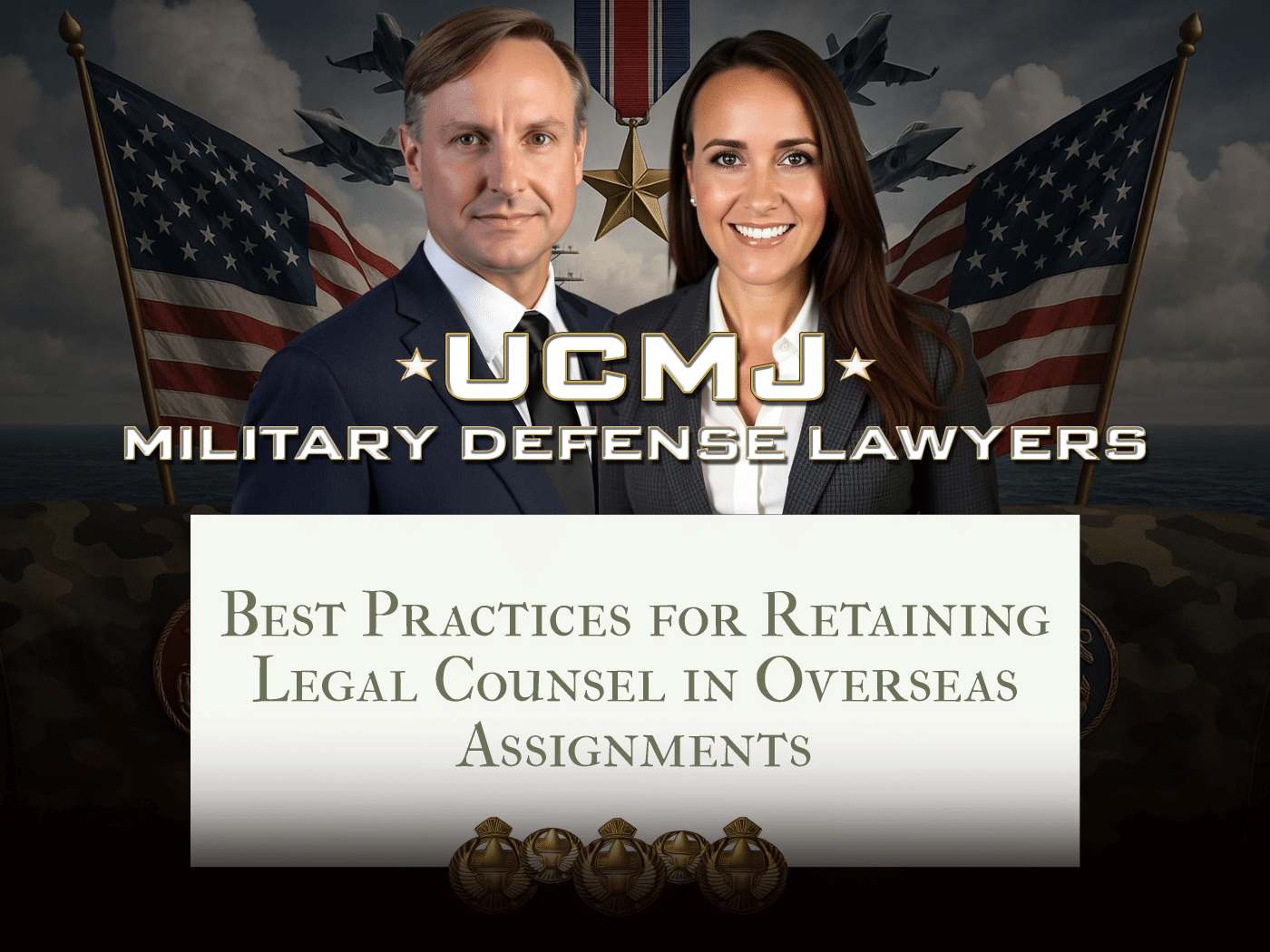For military service members and their families stationed abroad, dealing with legal concerns can feel overwhelming and uncertain. Navigating military courts, local laws, or administrative actions far from home heightens fear, confusion, and stress. Whether you are facing allegations or simply planning proactively, securing Overseas Military Counsel is vital to protecting your rights and future. Experienced legal representation familiar with military law in international settings offers clarity, reassurance, and strategic support. Having an advocate who understands your position and the cross-border legal process can make all the difference when your career, reputation, or freedom may be on the line. In this guide, we’ll outline the best practices for retaining legal counsel while stationed overseas, explain how the legal process unfolds abroad, and offer expert strategies to help you manage these high-stakes challenges with confidence. Whether you are active-duty personnel, a dependent, or an advisor, understanding the intricacies of Overseas Military Counsel gives you the tools to make informed, empowered decisions no matter where your assignment takes you.
Understanding Overseas Military Counsel and What They Do
Overseas Military Counsel refers to legal professionals who offer defense services and legal support to uniformed service members stationed outside of the continental U.S. These attorneys often specialize in military law, international agreements, Status of Forces Agreements (SOFAs), and cross-jurisdictional procedures. They assist clients with a variety of issues, including courts-martial, non-judicial punishment, administrative separations, and criminal investigations involving host nations.
For example, consider a soldier stationed in Germany who is facing a court-martial related to an off-duty incident in the local community. The soldier may require legal representation that not only understands the UCMJ (Uniform Code of Military Justice) but also host nation legal sensitivities and SOFA boundaries. Another instance may involve a Navy sailor in Japan accused of violating a command policy. Having a counsel with overseas military experience means understanding both command culture and regional concerns.
Retaining Overseas Military Counsel ensures that a service member’s rights are protected while navigating two intertwined legal systems—the U.S. military and the host nation’s framework. These legal representatives are especially skilled at anticipating complications in culturally and legally diverse settings, helping clients avoid missteps that can jeopardize their case or security clearance.
Why Choosing the Right Overseas Military Attorney Matters
The ramifications of inadequate legal representation while serving abroad can be serious, especially when the military judicial process is occurring thousands of miles from the safeguards and networks you’re familiar with. The difference between a local trial defense service and a private attorney experienced in overseas military law could be the difference between a discharge and an acquittal. An attorney who understands both global deployment environments and military legal protocols brings meaningful advantages to the defense of your rights.
Real-life scenarios reveal just how significantly Overseas Military Counsel influences case outcomes. Here are just a few common scenarios that show what’s at stake:
- Scenario 1 and consequence 1: A Marine facing sexual assault allegations in South Korea retains an inexperienced attorney unfamiliar with SOFA agreements, resulting in delays and misunderstandings with host nation officials. The case is escalated unnecessarily and leads to a general court-martial.
- Scenario 2 and consequence 2: An Air Force member in Italy incorrectly believes their administrative separation doesn’t require legal representation. The result is an Other Than Honorable discharge, harming future employment opportunities and VA eligibility.
- Scenario 3 and consequence 3: A Navy officer accused of misuse of government funds in Bahrain hires a stateside civilian attorney who lacks clearance to work on military installations abroad and struggles with access. Crucial prep time is lost, weakening the defense strategy.
The Process of Working With Military Counsel While Stationed Abroad
- Step 1: Initial consultation. This step typically involves confirming the scope of the legal issue and determining whether military or civilian counsel is best suited to handle your case.
- Step 2: Retaining counsel. Once you choose a qualified Overseas Military Counsel, they will file necessary authorizations and begin coordinating with your local command and legal officials.
- Step 3: Legal strategy and representation. Your attorney will collect evidence, build a defense, and represent you in Article 15 hearings, courts-martial, or administrative actions as needed. Communication usually happens remotely when required, with in-person meetings where feasible.
Effective Strategies for Handling Legal Cases Overseas
Common Questions About Military Lawyers for Overseas Personnel
How Gonzalez & Waddington Helps Clients Facing Legal Issues Worldwide
With decades of global military legal experience, Gonzalez & Waddington understands the stress and complexity of facing legal troubles during an overseas assignment. They have represented service members from every branch stationed in Europe, Asia, the Middle East, and beyond. Their team is composed of former military prosecutors and JAG officers who know how to protect your career and your future. From courts-martial to administrative boards, they provide aggressive, unwavering representation while treating clients with compassion and respect. Gonzalez & Waddington goes beyond simply knowing the law—they know military culture and can anticipate how command decisions are made. Their ability to operate efficiently in distant time zones, communicate with overseas commands, and mount compelling legal defenses has given countless service members peace of mind and successful outcomes. For those far from home, trusting this firm means knowing you are not alone.
Quick Recap of What You Should Know About Legal Help While Overseas
.


